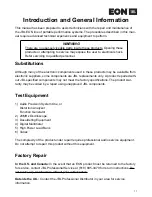
This page is a list of definitions and explanations used throughout our
instructions to aid you in the assembly of your play set.
Offset Holes
- Throughout the installation procedures we will refer to parts with offset
holes. This refers to the orientation of the holes on the board. An offset hole is one that
is closer to one side than it is the other or in other words, it is not centered on the board.
In the procedures you will be instructed to attach the boards with the holes offset up or
with the holes offset down. This refers to which side of the board the hole/holes should
be closer to. Offset holes up= hole/holes will be closer to the top of the board. Offset
holes down= hole/holes will be closer to the bottom of the board. Note: some parts do
not have offset holes, but instead the holes are on center. Therefore there will not be
any reference to how to offset these parts.
EXAMPLE OF OFFSET HOLES UP
EXAMPLE OF OFFSET HOLES DOWN
Counter-sunk holes
- Many of the parts that will be used have counter-sunk holes.
A counter-sunk hole is one that surrounds one side of a thru hole, but does not extend
through the wood it’s self. When using a counter-sunk hole the bolt will be inserted
through the thru hole and either the head of the bolt and washer or nut and washer will
occupy the counter sunk hole.
Lag Screws
- Lag screws are used in the construction of our play sets to enhance
the structural integrity of the unit. There will not be predrilled holes in the post for lag
screw installation. Lag screws are self-tapping, though if you are using a manual socket
wrench it may be necessary to tap the head of the lag screw with a hammer. You should
also be sure to tighten the lags completely. Power tools such as an impact wrench or
power drill should have enough torque to drive the lag screws without using a hammer,
but make sure not to over tighten as this can cause the threads to “strip out” in the post.
Counter Sink Hole
Thru Hole
Page 12
®













































